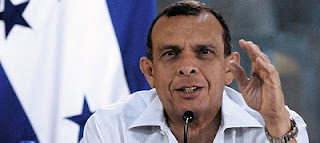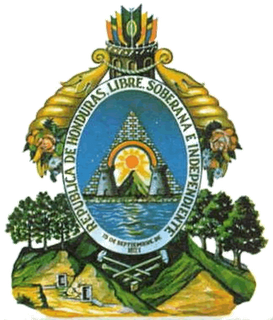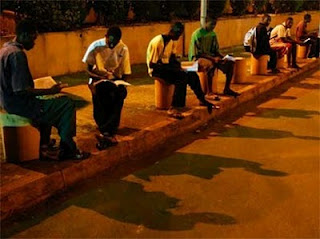Everyone has heard of the crisis in Honduras since 2009 June 28, the day President Zelaya was expelled from the country. But the world did not know the origin of the crisis caused by Zelaya’s attempt to impose a National Constituent Assembly in order to draft a new political constitution which would have allow him to stay in office. In order to justify the change of constitution he called an election tainted by legal flaws.
June 28 was the day the consultation would take place, and the military intelligence received information of Zelaya’s dire intentions, his plan to dissolve Congress and the Supreme Court in the same day.
The Supreme Court issued the arrest warrant and the military executed part of that warrant, but the surprise was that instead of sending him to the competent judicial authority they led him by force to Costa Rica.
This was enough for the so-called “international community” to vigorously denounce a coup d’Etat in Honduras, and a military takeover of power.
Even when the legal basis for the expulsion of Zelaya was explained, as well as the state of necessity forced by the need to save lives and protect the constitutional order, the international opinion stubbornly described what happened as a coup d’Etat.
But in a real coup Congress and Supreme Court are dissolved and the military rules by means of decree-laws. That is not what happened in Honduras, instead a civilian government from the same political party of Zelaya seized the management of the Honduran State, ending the electoral process that had begun in 2008 under the tutelage of Zelaya’s administration.
The constitutional order was not broken in June 28, 2009, but there was a substitution of the executive branch, and even some of Zelaya’s ministers continued in office in the Micheletti administration. The State does not depend on this or that person to survive, any officer may be replaced with the State order remaining intact.
The way to replace a president is set in the Constitution, and that was the procedure followed to invest Roberto Micheletti as head of the executive branch, because as president of Congress he was the next in the chain of command to replace the ousted ruler, having resigned the vice-president Elvin Santos.
When the international public opinion knew that in Honduras there was not a military regime, but a civilian rule based on the same constitution, it was already too late. The sense of pride and prestige of world leaders prevented them from acknowledging publicly that they had been wrong. Also the fear of presidents of being overthrown prevented them from recognizing the legal presidential substitution.
An international media campaign against Honduras, headed by Hugo Chávez, defamed by every means this little country, accusing the Micheletti administration of savage human rights violations. Meanwhile Zelaya toured Latin America discrediting the country of his birth.
And as the interim regime was not scheduled to last long, its main mission being to safeguard elections that would give rise to a new administration, no country wanted to risk its prestige by recognizing an interim administration accused of being coupster and human rights violator.
But the elections were held successfully on November 29, with an orderly transition of command, which allowed Honduras to obtain recognition from many countries, with the exception of those countries allied with Hugo Chavez.
These elections have eased social tensions caused by the overthrown of Zelaya, but the threat against Honduras is not over yet.
The Lobo Administration
Honduras’s enemies, internal and external, are scheming to see how to take control of this little country, and the Porfirio Lobo’s administration seeks to appease these enemies by granting their requests and offering them positions in the government.
President Lobo mocks those who supported Micheletti, saying: “these blanquitos (Whiteys) didn’t even vote for me.” (Lobo disparagingly calls ‘Whiteys’ those who supported Micheletti, in reference to the protests in which they walked wearing white clothes at the heights of the political crisis). Thus President Lobo mocks those who defend the current Constitution, accusing them of being of the “far right”, offending the national dignity, dignity that was raised very high by the Micheletti administration, who strongly opposed the blatant foreign interventionism in the Honduras’ internal affairs.
President Porfirio Lobo wanted to give the appearance of neutrality in his political campaign, not leaning toward any of the warring factions represented by Zelaya and Micheletti, but just before the elections he tacitly expressed some sympathy for Zelaya.
And as soon as Lobo sweared to “respect and enforce the Constitution and its laws” in his inauguration, he violated his promise providing a safe passage to Zelaya, thereby protecting a fugitive from justice. Lobo then referred to Manuel Zelaya as ‘President Zelaya’, saying: “It’s not acceptable to have a president locked in an embassy.” Zelaya took refuge in what used to be the Brazilian embassy, and the right thing to do was to ask him for a formal request of political asylum in the country of his choice if he wanted to exit the country without being arrested. Referring repeatedly to Zelaya as ‘President’, and later in Spain, saying that what happened in Honduras was a ‘coup’, Lobo has put into question his own legitimacy as President.
Now Manuel Zelaya is in Santo Domingo, always conspiring against Honduras’ interests, and even against the interests of Lobo, who asked nothig in return for his liberation. And to this day Zelaya has shown not one ounce of public gratitude for being set free by Lobo.
Besides granting amnesty for political crimes in favor of Zelaya and his followers, using the mechanical majority of members of the officialist party at Congress, President Lobo has put pressure on the Supreme Court to restore some Zelayista judges dismissed for political proselytizing, and has even spoken repeatedly of his readiness to conduct a referendum to allow the call for a National Constituent Assembly, an action that was the reason for Zelaya’s removal.
Mr. Lobo has appointed a troublemaker Zelayista —Cesar Ham- as the head of the National Agrarian Institute (INA), who has only worsened a problem of invasion of cultivated land belonging to businessman Miguel Facussé. By promoting legal uncertainty in the rural land the Lobo administration discourages urgently needed investment.
President Lobo has gone so far as to offer himself to personally bring back Zelaya to the country, watching over him to prevent his arrest.
Lobo’s latest blunder was to denounce a conspiracy to overthrow him, without offering any evidence of such a complaint, but he soon decided to take vacations in South Africa to see the Soccer World Cup, showing he is not serious in his report of the alleged threat of a new coup. The fact that these statements damage the country’s investment climate does not seem to be a concern for the irresponsible Lobo in the slightest.
And on top of this irresponsibility, Porfirio Lobo left abandoned the public administration, and it was not known for certain whose vice-president was appointed as temporal substitute for Lobo.
President Lobo made his unexpected statements about new coup threats when some reporters asked him about his alleged intentions to remove the president of the Supreme Court from office. This clearly seems to be a diversionary maneuver by Lobo.
With his actions and words President Lobo is made to look, as every day goes by, more and more like the deposed Zelaya. Many of thouse who supported Micheletti also voted for Lobo, only to be disappointed by his unworthy conduct serving as president, since even though Porfirio Lobo has done everything possible to appease his Zelayista enemies, they continue in their denigration of him. Porfirio Lobo sells cheap the country, he gives everything in exchange for nothing.
If those who voted for Lobo were trying to cast away the influence of Zelaya —given that Zelaya stil regards himself as a Liberal Party member, while Lobo has belonged to the rightist National Party— they are now disappointed by the attitudes of Lobo.
Thus a climate of uncertainty persists in the country. The Lobo administration has no clear direction and apparently the ghost of Zelaya is still haunting us.


